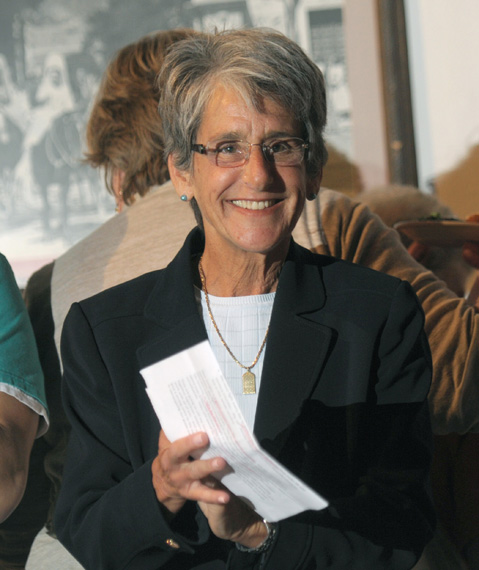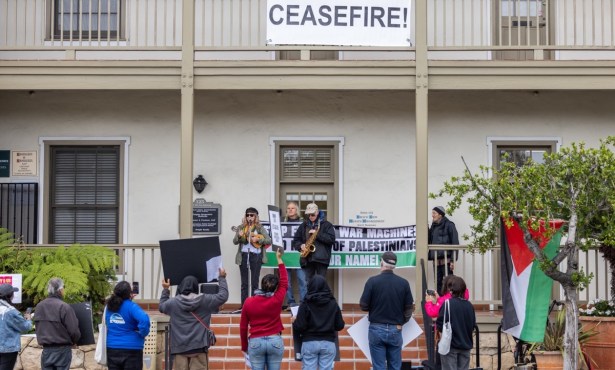Air Force Study Opens T-Ridge Drilling Prospects
County Endorses Jackson Bill to Close Loophole and Halt Potential Project
As a game of tug-of-war over the prospect of drilling on Vandenberg Air Force Base continues, it remains to be seen which side will gain the most ground. Under congressional pressure, air force officials recently publicized a much-anticipated assessment that opens the possibility for drilling — an idea previously thought dead. When news of the study first broke, State Senator Hannah-Beth Jackson introduced a measure — SB 1096 — to ban offshore drilling in Tranquillon Ridge state waters.
On Tuesday, the Board of Supervisors endorsed the bill in a 3-2 vote on partisan lines. In a relatively succinct and cordial fashion, supporters spoke about the catastrophic risks of a spill in a designated marine-protected area, while opponents charged the bill goes too far and would close the door on future economic opportunity. “The bill would essentially give our county the same protections as the rest of the state,” said Linda Krop, chief counsel for the Environmental Defense Center, which sponsored the bill.

Though California law prohibits new offshore oil and gas leases in state waters three miles from the shore, an exception exists when oil from state reserves is drained by nearby wells in federal waters. Eleven oil fields off the coast straddle the state and federal boundary, but Tranquillon Ridge, or T-Ridge, is the only underwater formation being drained by operations in federal waters.
T-Ridge is located off Vandenberg, the third largest air force base in the country, and the military is required to sign off on any new projects because drilling could potentially pose safety risks for the base and cause environmental damage. While much of the study was redacted, presumably for security reasons, it identifies a 25- to 30-acre onshore location in the southern part of the base that is “feasible” and “preferable” for drilling up to 30 wells through extended-reach technology.
The chosen site, compared to several other potential locations, is closest to T-Ridge and expected to yield the largest volume of oil. Space launch missions would periodically disrupt operations for up to several days at a time, the report states, but it does not specify how frequently. Potential debris from failed launches is also noted as a concern. The site would not require a processing plant, and “dry oil” — after it’s been separated from produced water and gases — would be transported through an underground pipeline to a plant in Lompoc.
For nearly a decade, military officials declined to approve any such project, but these new assessments indicate a change of heart.
But area environmentalists and politicians disagree that extended-reach drilling is safer compared to offshore extraction. Calling the report “terribly flawed” and “terribly biased,” Senator Jackson argued onshore drilling is not any safer, because the operation would be located near the Santa Ynez River. “It defies logic,” she said, adding the study fails to consider air-quality issues. At the national level, Congressmember Lois Capps wrote a letter last September opposing any new drilling and urging air force officials to be more transparent.
Five years ago, many of these environmentalists and politicians actually supported a T-Ridge project in an unprecedented agreement with the oil company Plains Exploration and Production, also known as PXP. The Environmental Defense Center, which hired Jackson as a consultant, drafted a proposal that would have allowed up to 17 wells from Platform Irene to drill into two new state leases on the condition of an “end date” to drilling in 2022. Thousands of acres of land were also to go into public trust. The county approved the project, which was estimated to produce 40 million-90 million barrels of oil, but the State Lands Commission ultimately denied it.
The player with the biggest head start to drilling on Vandenberg is Bob Nunn and his company, Sunset Exploration, in partnership with ExxonMobil. On Tuesday, Nunn argued the bill would close the door on economic benefits for local cities and schools. A multiagency regulatory process would be required before any project could advance, Nunn stressed. “I’m not even the favored son here,” he said, adding a competitive process will take several years. According to a consultant hired by Sunset, a previously proposed project would generate 113 million barrels of oil, more than $10 million in sales taxes to the county, and more than $2 billion in royalties to the state.
Last week, the bill passed out of a fiscal impact committee and will soon go to the Assembly floor.



